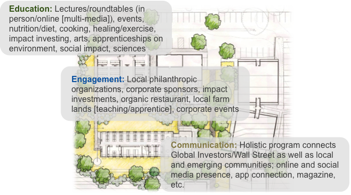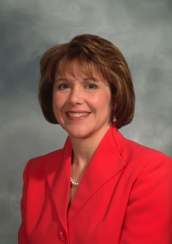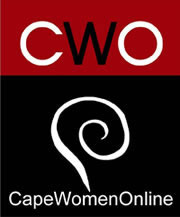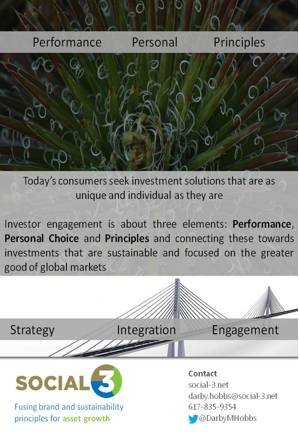CapeWomenOnline - Where Cape Women Shine
Your local venue for the women of Cape Cod to share their ideas, experiences and resources while inspiring each other in their life's journey
Inspire . Encourage . Network . Share
Sustainable Thinking and Living: How It Connects Citizens and Communities
by Darby Hobbs, CEO & Founder SOCIAL3
Intellectual curiosity. Not everyone possesses it. But, how do you get it? It's not something that you lose and recapture, then keep close to your heart. You either have it or you don't. You're either wired to continually learn and push yourself, or lay back and wait for the world to greet you.
You are either the one who leads while others follow, or you devise paths for others to eventually take, putting up their own buildings along the way, but the highway they travel on was developed through your vision.
Turning intellectual curiosity into action can only happen when there's a connection between what a person is learning about and what they are passionate about.
That emotional connection brands the thinking down a dual path, strengthening any disruption that might occur, such as conflict of the heart, or a colleagues passing statement that would unearth anyone's convictions if they weren't strongly founded in their footing.
What a blessing it is to achieve this dual state of learning and passion, wrapped nicely together in one package that sustains us over time.
In fact, you can take any topic that impacts your life and I bet you can draw parallels of interest in these items to what you value; what you feel is important to you. It's highly unlikely that what you are intellectually curious about you are not passionate about as well.
This passion equates to a level of value for you as a consumer, whether it be centered on what you eat, where you shop, where you live, how you get to work, what car you drive, if you enjoy sports, how you sleep, where you socialize, what you read and so on. The list is endless.
But no matter what choices you make that converge your intellectual curiosity with what you're passionate about, the biggest effort is how to sustain this cross-section in your life so that what might seem like a fad actually becomes a way of living.
Today, many consumers are engaged with understanding how to be more conscious with their choices, especially in terms of how their decisions impact the environment and society.
Global climate change, water scarcity, energy choices, food development and production, the use of GMOs… Is sugar and gluten really bad for certain body types or all of us? Is there a fundamental difference between organic and natural foods? Is 'natural' more of the marketing term but doesn't correlate at all to being organic?
What about the use of corn syrup in sausages? Why use corn syrup at all in our food production? And why does corn syrup exist as the first ingredient in most baby formulas? These are just a few examples of what today's consumer is discussing and investigating.
Shoppers at Whole Foods or organic markets are more apt to be reading food labels and shopping the perimeter of a grocery store rather than the aisles. Food preparation and magazines to read at these centers are majorly focused on health and being that 'educated' consumer about what our environment is doing to us and for us.
To keep it doing 'for us' in a generous way there are fundamental things that must shift. The biggest is educating ourselves into what delivers sustainable thinking and living.
Delivering the message of sustainable living is more apt to be taken seriously or accepted if the fabric of that message is engrained in our daily living. So, easy to obtain, touch, feel, sense and accept. Not too dissimilar to any consumer choice we make every second of the day; if it's in front of us we tend to pay attention.
Today, with social media channels, that touch point is feverish and ever present, sometimes causing mayhem with too many inputs and not enough outputs for us to act on with any sense of clarity or continuity.
Hence the need for introducing a Sustainable Institute. At SOCIAL3, we have recognized the next evolution of capturing the attention of the consumer in terms of impact. What are they passionate about and how do you introduce a way of living that embodies these value structures into their daily choices?
The Sustainability Institute is focused on mainstreaming the sustainability conversation by bringing it to life through education, engagement and communication.
It takes multi-tracks to nudge today's consumer into thinking about sustainability in their lives. The norm is social media, which is a very important element to the overall conversation, the 'live' conversation with today's decision maker.
However, another element that is also important is the 'bricks and mortar' and community outreach upon which elements of sustainable thinking and living come to life. It's about education, engagement and communicating 'live' within a consumer's community, and then extending the conversation online.

It's a way to intertwine transparency both in terms of building relationships with 'citizens' directly as well as continuing that dialogue globally through interactive, social media channels. There are three elements to reaching a consumer or 'citizen' of this greater global community:
Education
Engagement
Communication
In each one of these elements there are unique touch points that allow for different experiences and organizations to touch these 'citizens' and begin to turn the tide towards acceptance and understanding of living and making choices that not only sustain oneself as well as family and friends, but also serve as the connecting point in a greater global community around these same issues.
How does one choose to live their individual life in light of supporting and taking care of mankind overall? The idea put forth with the Sustainability Institute is that we begin to educate and communicate more widely with 'citizens' to build a level of understanding and ultimately engagement that taking care of oneself is important. Doing so with an eye towards our fellow mankind is the next evolved step.
Decisions today on choices for oneself, if they are thought through with a sustainable architecture, will then, over time, permeate to wider audiences and ultimately become a way of life for us all.
We do not live on a planet with infinite resources, and given that we must begin to protect our resources and way of living for generations to come, thinking sustainably is the first step towards that goal of preservation.
What decisions people make today on health, nutrition, energy sources, food production, travel and investments are key towards the outcome of answering the following:
What should we eat?
Where do we purchase healthy, organic options and how do we sustain this for local and global communities?
What holistic medical options do we investigate and embrace on an integrative level?
How do we produce healthy food from farm to table?
How do we reduce our addiction to sugar and gluten and learn to make healthy food choices for our body metabolisms?
What is required to alter the processed food epidemic?
What options are sustainable in terms of energy?
What chemicals and toxins do we need to reduce, or get rid of completely, in our lives and in our local and global communities?
How are local communities expanding organic farming?
What financial investments do we make to fund growth of sustainable projects tied to impact and greater social global change?
Choices today are multi-dimensional; there isn't a silver bullet that can be applied to answer any of these questions. Each individual has to decide what type of life they want to lead not only for themselves, but also for their family.
Casting a net wide to capture total understanding of our environment can influence a consumer's ability to evaluate choices. Lack of education and transparency leads to 'citizens' choosing what they know and are comfortable with versus embracing and understanding the new normal that can protect them and their loved ones for generations to come.
It's thinking and making choices with an eye towards sustainability, not only for oneself, but for mankind overall. Franchising a Sustainability Institute concept in targeted communities begins to alter the conversation that occurs today to a more substantial movement whose trickle down impact is great – feeding that intellectual curiosity that permeates the enlightened consumer.
An enlightened consumer who requires greater transparency also embraces innovation and creative solutions. For today's companies that manufacture consumer products, this is the type of 'citizen' they would prefer to market to.
So, embracing thinking and living sustainably not only engages the consumer to a more holistic way of living, but also provides a growth platform for companies to engage with consumers to secure brand presence and value.
Both sides win, and the end result is a stronger global community networked through bands of sustainable relationships.
Sustainability Institute Source: SOCIAL3, copyright 2014

In line with her focus on fusing brand and sustainability principles for asset growth, Darby Hobbs launched SOCIAL3® in 2013, offering collaboration through a holistic lens to communicate the conscience of the financial services industry.
SOCIAL3® cultivates the Environmental, Social and Governance (ESG), Impact Investing and Corporate Social Responsibility (CSR) story lines and helps ensure that a firm's vision and strategy align with its marketplace engagement.
Darby is Producer/Anchor of Impact Investing News Update and ongoing content for Asset.tv in the area of Socially Responsible Investing (SRI), ESG and Impact Investing. In 2009, Darby became certified in CSR.
She has been a senior leader at Brown Brothers Harriman, Fidelity Investments, PNC Bank (PFPC), First Data Corporation and AMEX in marketing strategy, strategic and business planning, product development, public relations, communications and education. In 1996, Darby launched her first start-up that provided thought leadership, conferences and networking platforms for strategy, marketing and product professionals in the mutual fund industry. She later sold this business to Financial Research Corporation (FRC).
As a motivational speaker and presenter, Darby has participated in leading global platforms to educate and motivate senior managers in CSR/ESG/SRI and Impact Investing as well as brand, innovation, creative thinking and being a visionary. She is also a contributing writer for SOUND Magazine and Cape Women Online, in the area of business responsibility.
Darby has joined the Expert Advisors Council (EAC) at the Global Initiative for Sustainability Ratings (GISR). She participated as a judge with Brandeis University for their Bunson Investment Impact Challenge and she has been a mentor with Boston College Graduate course on Entrepreneurship and Business Planning.
She is also member of The Boston Club for Women where she serves on the strategic planning committee and is a member on the Education Committee of US SIF. In addition, Darby is a member of The Ad Club of Boston and the Financial Communications Society.
Email: darby.hobbs@social-3.net
Website: www.social-3.net
http://www.linkedin.com/company/social3



